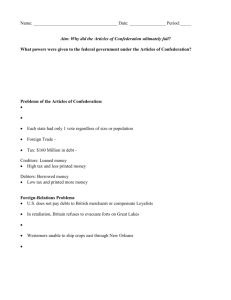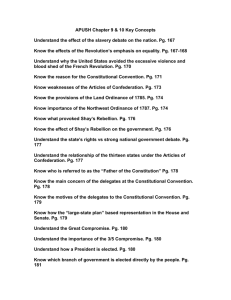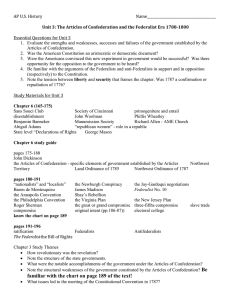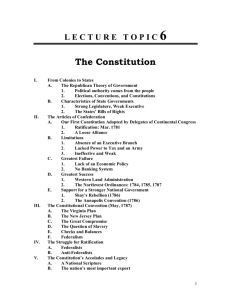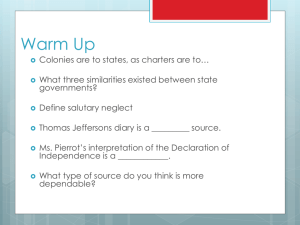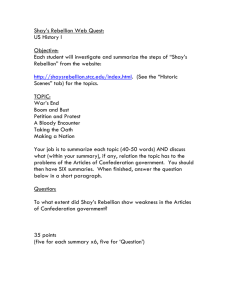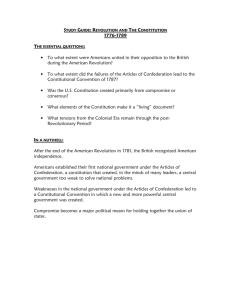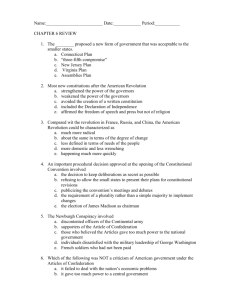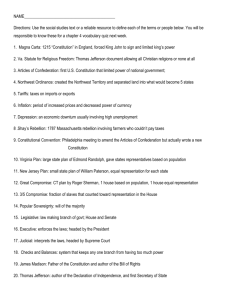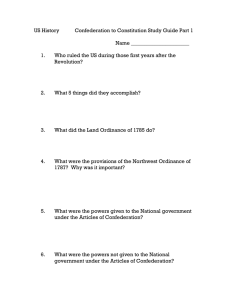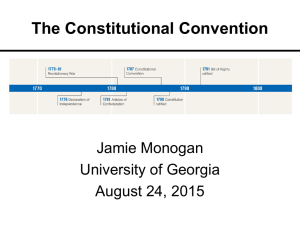The Critical Period
advertisement
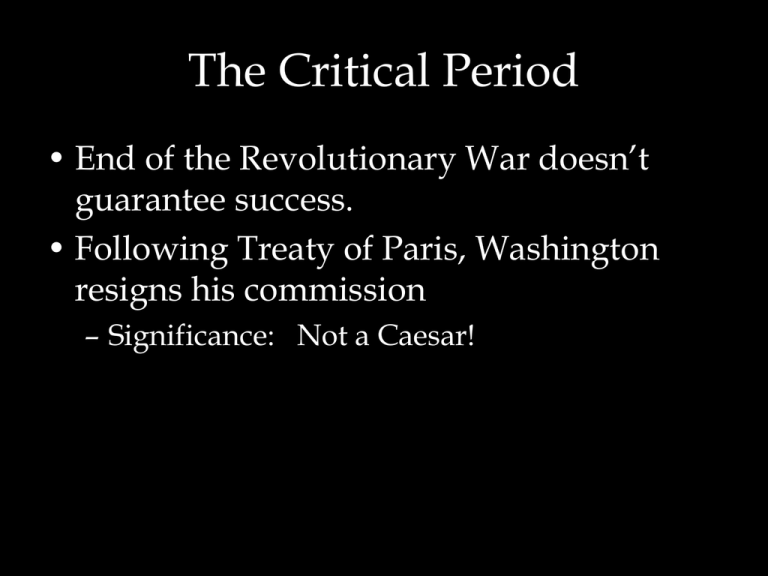
The Critical Period • End of the Revolutionary War doesn’t guarantee success. • Following Treaty of Paris, Washington resigns his commission – Significance: Not a Caesar! The Critical Period • Phrase coined to describe the transition from the winning of independence to the creation of the Constitution of 1787. • Nation organized under Articles of Confederation • Faces political, economic, and diplomatic hurdles Articles of Confederation • America’s “first” constitution - 1778 • A “confederation” – league of independent states, with a central gov’t for dealing with issues that effect all. • Forms a deliberately weak government. – – – – – – – No executive branch No judicial branch One vote per state representatives of states, not people. Supermajorities: 9 votes to pass ; 13 to amend No taxing power No power over interstate commerce (states imposing tariffs) No courts to settle interstate disputes (e.g., border disputes) • Earns nickname Articles of CONFUSION! Articles of Confederation • Successes – Secures foreign aid during the war – Holds nation together through war and aftermath – Negotiates a favorable peace – Deals with western lands Dealing with Western Lands • US is “land rich” and “cash poor.” • Congress convinces states to give up claims and turn over to the national gov’t. • Issues: – How to make land available? – Sell to speculators v. small landowners? • Land Ordinance of 1785 Surveys NW into • 6X6 m² townships • 36 sections • Education! • Religion? NW Ordinance 1787 • Establishes the process for bringing in new states. • When population hits 60,000 a territory can draft a constitution and submit to Congress for approval. • No colonies! • No slavery in the NW Territory (OH-IN-MI-ILWI) Failures: Foreign Affairs • The US is not respected by foreign nations. • Britain – Still has forts on US soil – “Dumping” cheap goods on the American market, hurting US manufacturers – Refuses to send an ambassador – Disputed border claims • Spain – Disputed land claims in southwest – Controls access to the Mississippi River (New Orleans) – Cuts of the “right of deposit” in 1784. • North Africa – American shipping is being raided by “Barbary Pirates” (Morrocco, Tripoli, Tunisia, and Algiers) – No navy / gov’t to protect Yankee shipping. Failures: Domestic • Economy – Debt and post-war hardship – Paper Money • States issuing paper money • Values fluctuate & vary between states, some won’t accept dollars from other states – Interstate trade – Shay’s Rebellion • 1200 farmers in Western Massachusetts • Many are former Rev War soldiers, paid in paper money. • Unable to pay taxes and debts (hard cash)…ask for paper money to be accepted as tender for payment of taxes and land debts. • Court foreclosures of property rebels close courts. Framing a New Gov’t • Reaction to Shay’s varies – Hamilton, Washington, Madison – see rebellion as “mobocracy” – T.J. – “a little rebellion now and again is a good thing…the tree of liberty must be watered with the blood of patriots and tyrants” • Gives steam to a movement to form a stronger government – Mt. Vernon Convention – Md / Va – Annapolis Convention – Philadelphia Convention Constitutional Convention • Delegates – Who’s there? James Madison, Alexander Hamilton, George Washington, Ben Franklin – Who’s not? Patrick Henry, Samuel Adams, Rhode Island! – Thomas Jefferson calls it a “convention of demi-gods.” – Significance: a group of men declare the existing gov’t bankrupt and ineffective and draft a new one, and submit it to the people for a year of debate without bloodshed! Compromises – Three “Plans” • VA • NJ • Hamilton – Representation: • Va Plan / NJ Plan / Great Compromise – Slavery • Slave Trade • 3/5 Compromise • Protections for….fugitives; suppression of rebellions – Executive • Nature… • The Rule of Secrecy – why? Isn’t it “undemocratic?” • The Va Plan – – Bi-cameral legislature (proportional representation in lower house; lower house elect upper house); national executive (7 years); national courts. • NJ Plan – Equal representation in a unicameral house. – Feels the Va Plan over-reaches the power of the convention and would not be adopted – Tradition: the states have had equal representation in every gov’t since 1776; Dec of Independence and Treaty of Paris recognize state independence • Hamilton Plan – Proposes a president elected for life! – Contrary to popular view that “Where annual elections end, tyranny begins”

